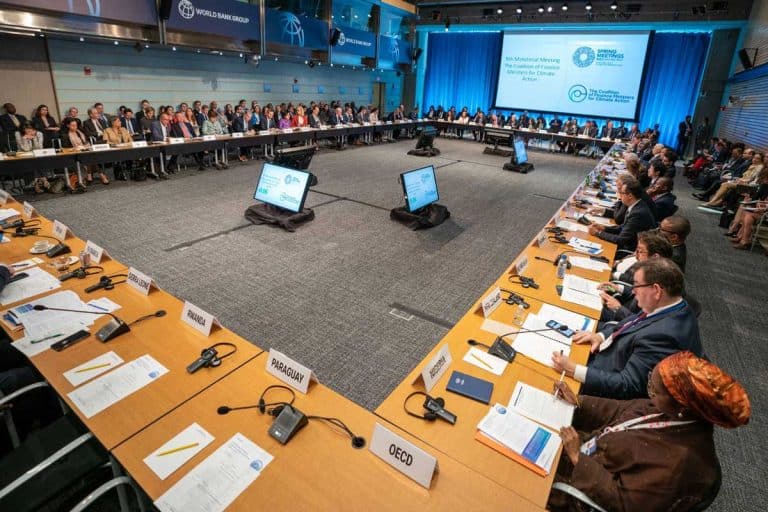This last month, Muslims, Christians, and Jews the world over have celebrated Ramadan, Easter, and Passover simultaneously – something that only happens about once every thirty years. This period of collective spiritual introspection is a powerful reminder of a central tenet of all religions: compassion – going out of one’s way to show concern for and relieve the suffering of others. This Ramadan, I have spent much time thinking about the lessons that a call to compassion can provide in our shared fight against climate change and our charge as stewards of the earth.
For Muslims around the world, Ramadan is a time of deep reflection and an opportunity to reconnect with oneself, take stock of relationships, and count blessings. The act of fasting is a physical manifestation of the importance of discipline and the shedding of excesses. By calming the gut through abstention from food, the hope is to calm and reset the brain in our continuous journey to become better humans.
During Ramadan, Muslims worldwide offer acts of charity – a touching reminder of the importance of compassion for humankind and our planet. Jews and Christians are called to the same introspection, compassion, and charity during their respective holidays – from including the less fortunate in the Seder meal to abstaining from an indulgence for forty days during Lent.
Historian Karen Armstrong studied the world’s major religions and found that “all faiths insist that compassion is the test of true spirituality. Each has formulated its own version of what is sometimes called the Golden Rule – to treat others as you would wish to be treated yourself.”
As my homeland, the United Arab Emirates, prepares to host the 2023 United Nations Climate Change Conference (COP28) this November, how can we use the lessons of these holy seasons to make compassion central to climate activism? How can the Golden Rule inspire us to empower and support the four billion people worldwide who are most vulnerable to the devastating impacts of climate change?
We must think of the mother in Pakistan dealing with the aftermath of devastating floods that killed almost two thousand people and caused trillions in damages, leaving 1.8 million people living near contaminated and stagnant floodwater – we must think of her as our own mother. We must think of the family in Kenya that is suffering without food and water during a dry season that has left many, especially mothers and children, incredibly vulnerable – we must think of them as our own family.

By 2050, crises like these will be widespread if we fail to take action. It is estimated that more than 140 million economically disadvantaged people from Sub-Saharan Africa, South Asia, and Latin America alone will be forced to migrate due to drought, food insecurity, and rising sea levels – all caused by climate change. Once we make this mind shift – caring for strangers as we care for ourselves and our families – impactful, equitable, and just climate action will follow.
In my role as United Nations Climate Change High-Level Champion for COP28, one of my main goals is to increase the resilience of four billion people to the effects of climate change. The Race to Resilience campaign aims to transform urban slums into safe cities; equip smallholder farmers to adapt to climate threats; and protect homes and businesses against climate shocks. We’ve already made progress: the campaign has made 2.9 billion people more resilient to climate hazards.
At the same time, the Roof Over Our Heads initiative puts women’s collectives at the heart of addressing the lack of access to safe and decent housing for the most vulnerable communities. By 2050, Roof Over Our Heads aims to improve the lives of two billion climate-vulnerable people living in informal settlements.
This is significant because women – especially poor women – are some of the most vulnerable populations: they are less likely to survive climate- related disasters due to existing gender inequalities, which can create disparities in information, mobility, and access to resources. Mothers, in particular, suffer increased risks to maternal and child health, like increased stillbirth in extreme heat.
As we prepare for COP28, it is also more important than ever to ensure that all voices are heard in the fight against climate change – including leaders and groups from different faiths that can help us navigate the complex ethical issues of equity, fairness, justice, and responsibility when we address difficult climate change decisions.
As we use this time to reflect on our roles as earth’s stewards, I come back – time and again – to compassion. This month offers a unifying reminder of our collective responsibility to our neighbors and to the world which we all call home.
The call to compassion – to treat others as we’d like to be treated – exists in every religion, and the reminder to take care of each other is urgent this month. As we fast, gather around the Seder table, or end our Lenten sacrifice – as we take time out of our busy lives to reconnect with what’s important – let us remember our duty to one another, and our duty to future generations.
Let’s unite together to take care of our home.









